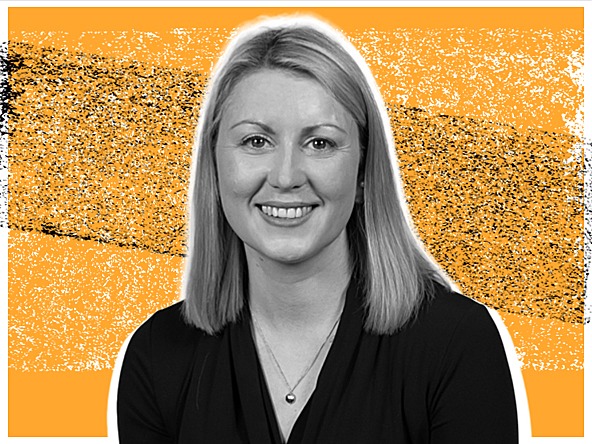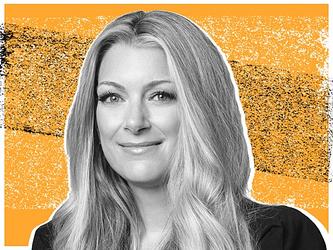How I work: Kelly Beaver, chief executive, Ipsos UK & Ireland

Katie McQuater (KM): What does an average day look like for you?
Kelly Beaver (KB): I get up around 5/5.30am on an average day. We have hybrid working, but I come into the office four or five days a week. I tend to work from home on a Friday if I can but most of the time I’m in, with clients or with the team. It’s just a personal thing for me – I get a lot of energy from spending time face-to-face with people and I think it’s really important to be visible as a leader.
One of the things I operate is an open-door policy – it’s very important to me and to the business – so I want people to feel like they can drop in and speak to me about any kind of issue, so being here enables me to be very visible in the office and allows colleagues to pop in and talk to me and they really do, which is lovely.
There are some things that are difficult to foresee with this job that just pop up. One of the parts of the job that is quite unique for a chief executive, in some ways, is the amount of media and broadcast requests that I get. That’s an interesting and exciting part of the job, and it also means that you are on call on early mornings, late nights and weekends, because when the press want an indication of public opinion on something like strikes, or the royal family, or whatever is happening in political circles at that time, they just have to follow the news, so a typical day could be from five in the morning until very late at night.
But if I am not doing those sorts of things in the evening, it’s really important to me to leave the office and be at home to spend some time with my eight-year-old daughter. There’s a little window of time, and so for me, it’s about making sure I get as much of that window between 6.30pm and 8.30pm to have some quality time with her before she goes to sleep, and then I can pick up anything urgent later on in the evening.
KM: Do you have any strategies to deal with the fact that those media requests can be quite unpredictable? How do you approach that in terms of managing your energy and time?
KB: First of all, you need to be able to do it, so you need to be up to speed with current data and polling, so that you feel confident and then it takes less time to prepare for those opportunities when they arise, because it is the job of the CEO at Ipsos to help raise the profile and the reputation of the business as well so it’s good to be able to say yes to as many as possible.
Being well prepared generally and always on top of the data we’re producing makes it a bit easier and less time-intensive so that’s something I do with my mornings on my commute – I keep up-to-date with the information that we’re producing.
I won’t say yes to everything – I will prioritise opportunities that have the biggest impact on our share of voice or where it’s considered to be a really important topic where we’ve got a lot to say – I do as much as possible but I also make sure I choose the best opportunities.
KM: What are your biggest current priorities – what’s keeping you busiest?
KB: At the moment, lots of CEOs will be watching and planning for the economic situation as it’s unfolding, and it’s something that I also have a close eye on, but we’ve been here before and we’ve weathered all sorts of other economic and other contexts. One of the benefits is that we have a very broad and diverse business mix, even more so than during the last significant economic downturn. For me, it’s making sure that we’re well prepared for what might come in the next three to nine months and that we’re taking a long-term view on where our investments are going across the business.
Of course, the other side of the economic context is the impact on our own staff and making sure that we’re providing support for our people during what is a very difficult, and for many, a new economic context – we’ve got somewhere close to 40% of our workforce who haven’t experienced this kind of economic context before, so as a management team we have to be very mindful of that and make sure that we help them navigate a new living environment.
Beyond looking at pay, there’s a really important piece about the employee offer around financial wellbeing. We do financial education programmes, financial clinics, free mortgage advice, retailer discounts and targeted wellbeing support. We’re constantly trying to refresh that to make sure that it’s best in class.
KM: It’s really interesting how the role of the employer has changed to an extent over the last couple of years, partly due to ‘the great resignation’ and changing expectations of the workplace.
KB: One thing I’ve been very passionate about is making sure we look after whole people and not just employees. People come to work, but they have whole lives around work and there will be lots of different life stages and phases that they go through. We’ve worked very hard to make sure that we’ve got the kind of policies that support people with a mix of the really positive life events but also the challenging things. You need to make sure that people feel like they have the right support from their employer in a more holistic way. I have a range of new policies that I’m looking at for the older workforce in particular, and some life challenges and traumas, like when people go through marital breakdown, for example – what kind of support can we as an employer provide for their mental wellbeing? We’re constantly looking at that and trying to make sure we look after people as whole people and not just employees in a business – and we’re still going with that, we’re not finished.
KM: Is there anything that helps you with your boundaries between work and life? Do you see it as a challenge?
KB: I really love my job and I thrive on being busy and being around people and delivering growth, whether that’s for people in their own careers or for businesses. But in order to do the best job that I can, I know that I need downtime as well and the thing that refreshes me most is spending time with my daughter, spending time with my husband and finding time for a small group of friends. I know that gives me energy and so I do need to put boundaries around work some of the time so that I can build that energy and so that I’m my best self when I come to work.
So, I do protect my time with my daughter, and sometimes I make tough choices. I didn’t make the Christmas play – I was really disappointed, but I had a work commitment. But my husband went, because I’m not a single parent – she has two parents, and he was able to go to that one. Sometimes I have to make compromises, like I can’t disappear to do a broadcast opportunity in the evening if my husband is working away, because I’ll have to say no to be present with my child. It’s not an easy balance to keep, but it’s really important.
Saturdays and holidays are really sacred to us as a family – we plan really quality time, we plan lovely things together and we’ve got a small dog and he’s very much part of the family, too. I try to get into the rhythm of the school holidays, as they’re very precious. My team knows when I’m off because they get a bit of a break that week! When I am on holiday, I will be available, but not as active from a work perspective.
KM: How do you foster that sense of balance within your team and the rest of the company?
KB: It’s something we continue to work on. We have hybrid working, but it is not the only means of flexibility we offer. For example, we removed core working hours, which means individuals can have conversations about their working patterns with their managers, being clear on when and where they’re working, which makes the teams happier and more motivated, quite frankly.
I also believe that spending time together in person really feeds our culture. As in any good relationship, the more time you spend together, the stronger your relationship can be, and so we do want people to come together but we also want them to have flexibility and choice. It’s also not just about people who have children or caring responsibilities – people also have hobbies, interests and passions, and having a no core hours working policy allows people to engage with those things more fully, too.
KM: Are there any tips and tricks that you’ve learned over the years to be more productive or balance your diary?
KB: Ah, the diary! Juggling parenthood with this kind of job, you have to be incredibly disciplined with your time and think very carefully about how you’re committing to things, and what you’re committing to, so that you truly have the bandwidth to cover everything that’s required, professionally and personally.
One of the things that’s really helped me is that if you know how to do something and you’ve been doing it a long time, the chances are you don’t need to be the one doing it anymore, you can pass that responsibility on to somebody else and it will allow them to grow in their role – so don’t feel you have to hold on to things.
The second thing that helps me is that I’ve realised through my time at Ipsos – I’ve been there for 11 years now – is that it’s an organisation where people come, stay and build careers, and this means that my senior team are incredibly experienced, and so I have this fabulous support. Building that team around you, of people who are better than you at some things, and have different skillsets and capabilities, means that you can give them autonomy of decision-making across the business, and means that it doesn’t always have to be you.
I also love people with a positive growth mindset and a can-do outlook and it means actually getting things done. If you surround yourself with people who believe things can be done – well, it makes a huge difference to the momentum of an organisation to have leadership with a positive, collaborative outlook. That exists here and so it means that this job, which can often be quite lonely, doesn’t feel like a lonely job, because of the senior level support around me and the positive outlooks. That makes it very manageable for me as a senior female leader with a young family.
I have to confess another tip, which is much more operational, is about Sunday evenings – this time is so helpful for getting ready for the week ahead and I tend to use a couple of hours on a Sunday evening just to make sure that I’m ready to go – I don’t expect anyone else to do that, but I find it very therapeutic and helpful.
This interview has been lightly edited for clarity.

We hope you enjoyed this article.
Research Live is published by MRS.
The Market Research Society (MRS) exists to promote and protect the research sector, showcasing how research delivers impact for businesses and government.
Members of MRS enjoy many benefits including tailoured policy guidance, discounts on training and conferences, and access to member-only content.
For example, there's an archive of winning case studies from over a decade of MRS Awards.
Find out more about the benefits of joining MRS here.














0 Comments